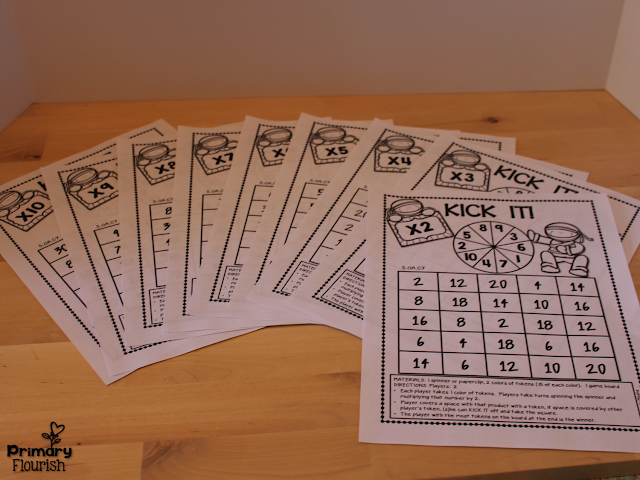Hi, teacher friends. It's Peggy Means from Primary Flourish with some tips to help your students 'flourish' in their learning - using games!
Research shows 'worksheets don't grow dendrites'!
If students are engaged and having fun with meaningful content -
they.will.learn!
Games are engaging and fun!
Kids do learn as they play!
I used to think that I could only use a game if I had previously taught the concept.
Not true - so I learned 'by accident' ;)
I was in a pinch one day because our week had been shortened with a Monday holiday - So I thought I would just use the phonics game to teach the spelling patterns we were covering that week.
The kids were so motivated to learn the patterns- so they could play the game!
Ta-da moment for the teacher!
Games could be used to teach.
Sometimes I would use my document camera and sometimes we would meet on the rug to learn 'how to play the game' - which included learning the concepts.
I used this game to introduce and teach the spelling patterns 'ew' and 'ui'. We read and sorted all the words as a group, and then I released them to play (independent practice) with a partner.
The same games can be used for guided practice portion of your lesson. Just partner or group the students to play as you walk around and monitor their understanding of the concepts.
Once the academic concepts have been taught and practiced, the students can gradually be released to use the games as independent practice in your lessons.
I try to add two components to the games at this point, an answer key and
mini anchors poster of the concepts being taught - so students can refer to them as they play.
The answer key and the anchor posters help the students to self-check their use of the new concepts.
Centers provide wonderful opportunities to use the games to review and reinforce concepts that have been previously taught.
Here is an example of some multiplication games that make differentiation a breeze!
After assessing your students, partner or group students to practice the particular multiplication table that they need practice on.
Many authors include black and white versions of their games.
These are perfect to send home as homework. Games provide families with a friendly framework to practice concepts in a fun context. Parents appreciate this kind of homework because their kids are usually eager to play a game, whereas a bundle of worksheets are tedious not only to their kids - but to the parents as well.
I hope I have inspired and given you some ideas on how to use games in your classroom this year to help your students 'flourish' in their learning!
















Peggy,
ReplyDeleteThis blog post is so dang pretty! Love your tips for math games as well!
Kristen
Hi Peggy - This is a great post! Games can be used so many different ways in the classroom and they are pretty much guaranteed to motivate! I like how you pointed out that you don't have to wait until your kiddos have learned a concept before using a game - definitely something I need to remember! Thanks for the link up! - Lisa
ReplyDeleteHi, Lisa, thanks you for linking up - I love those games of yours!
ReplyDelete